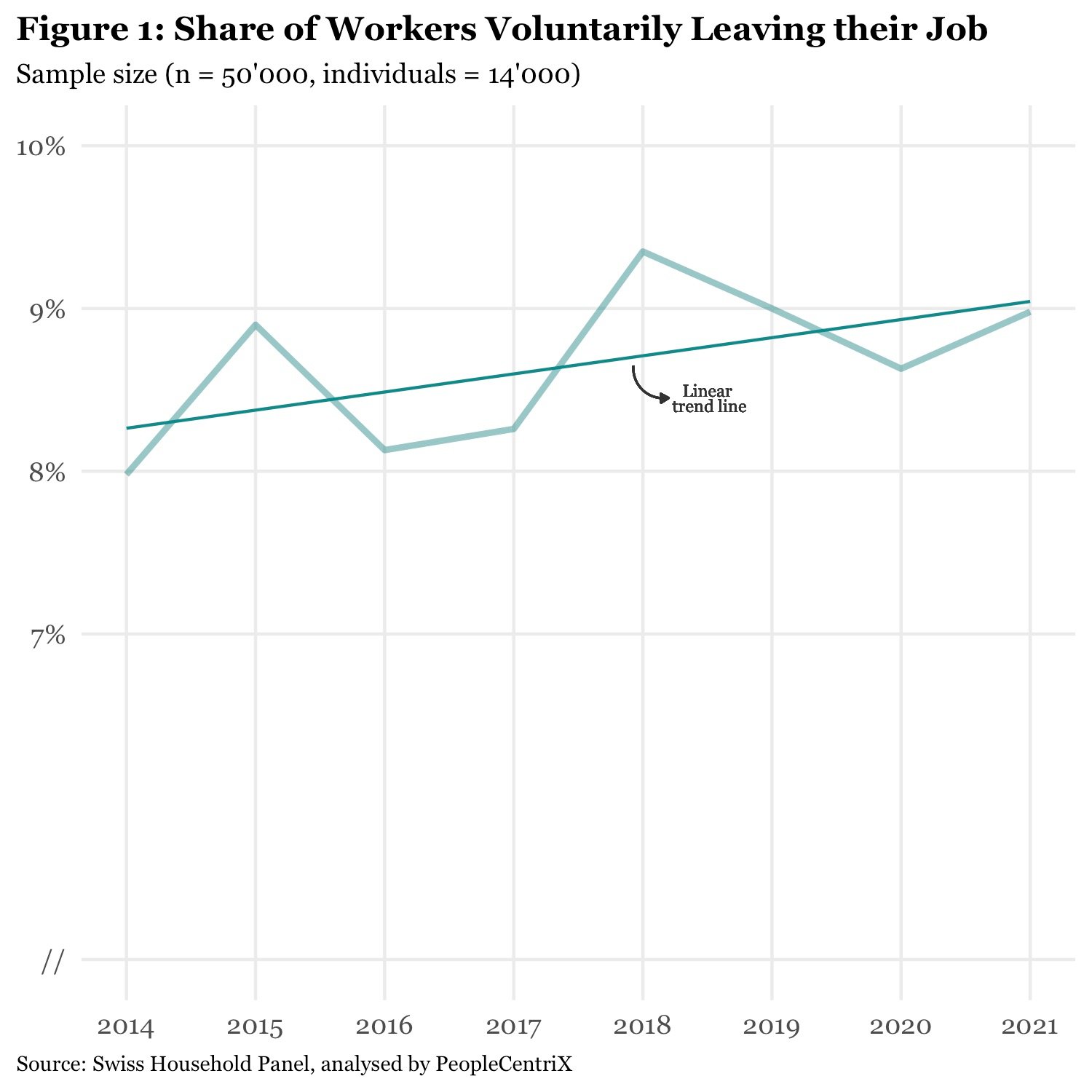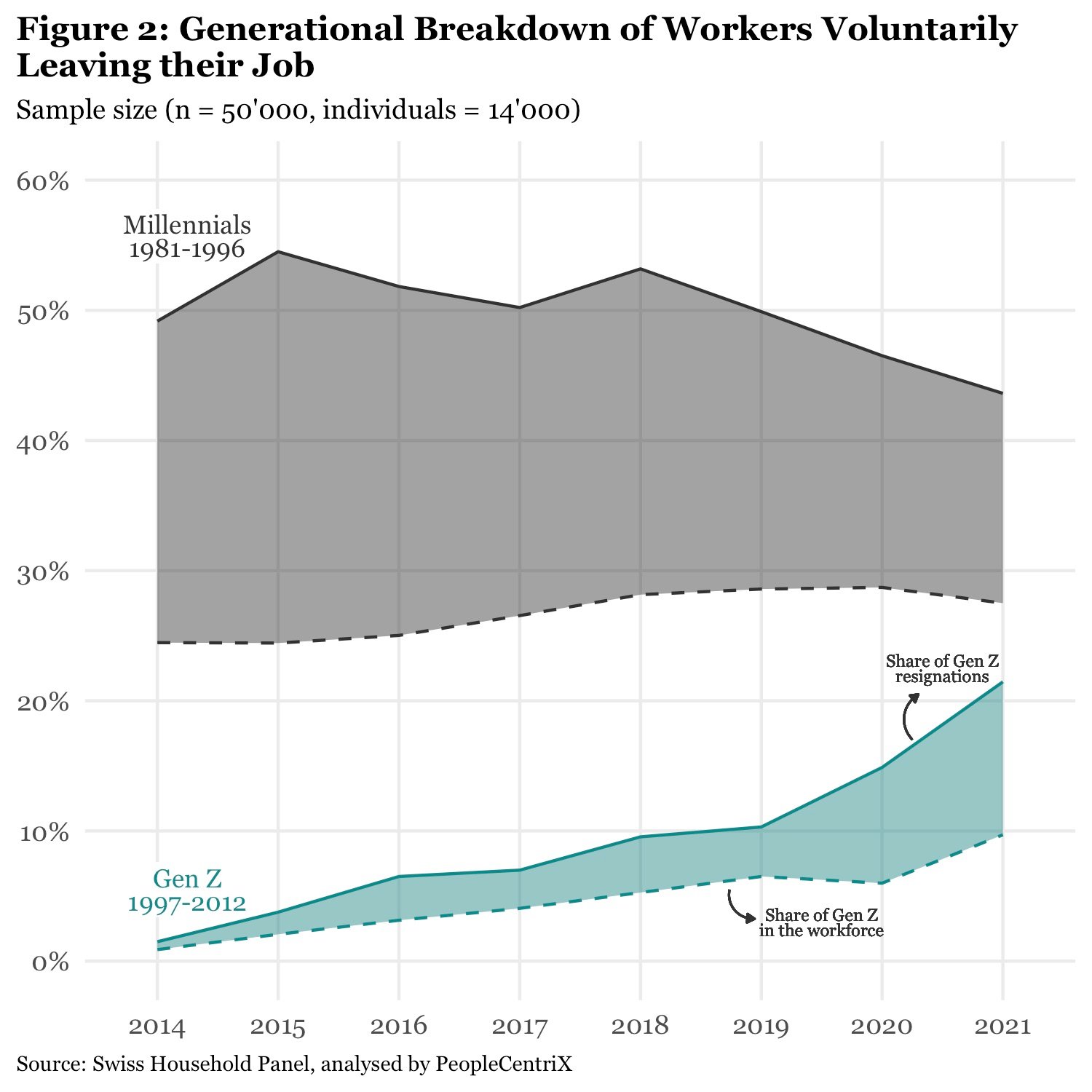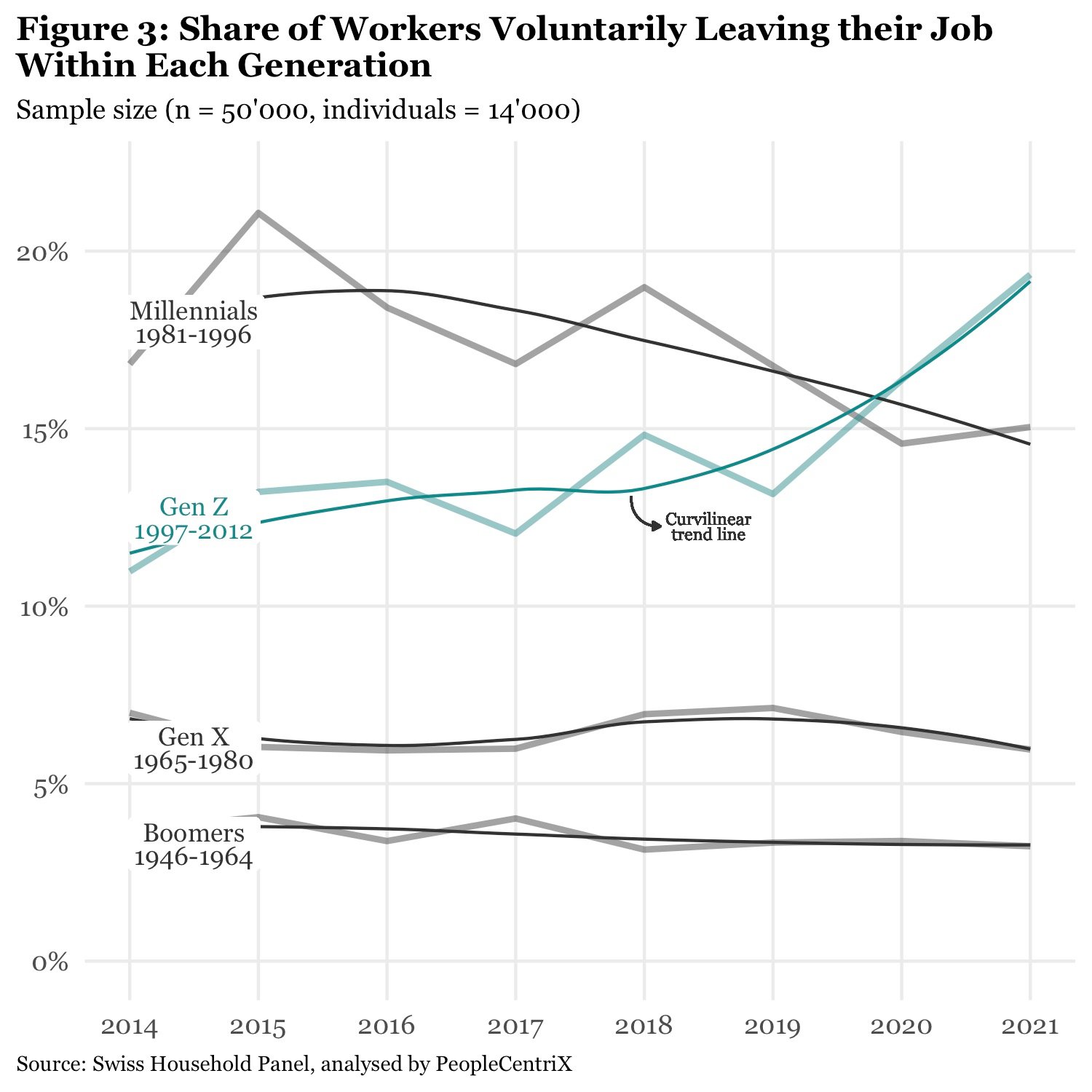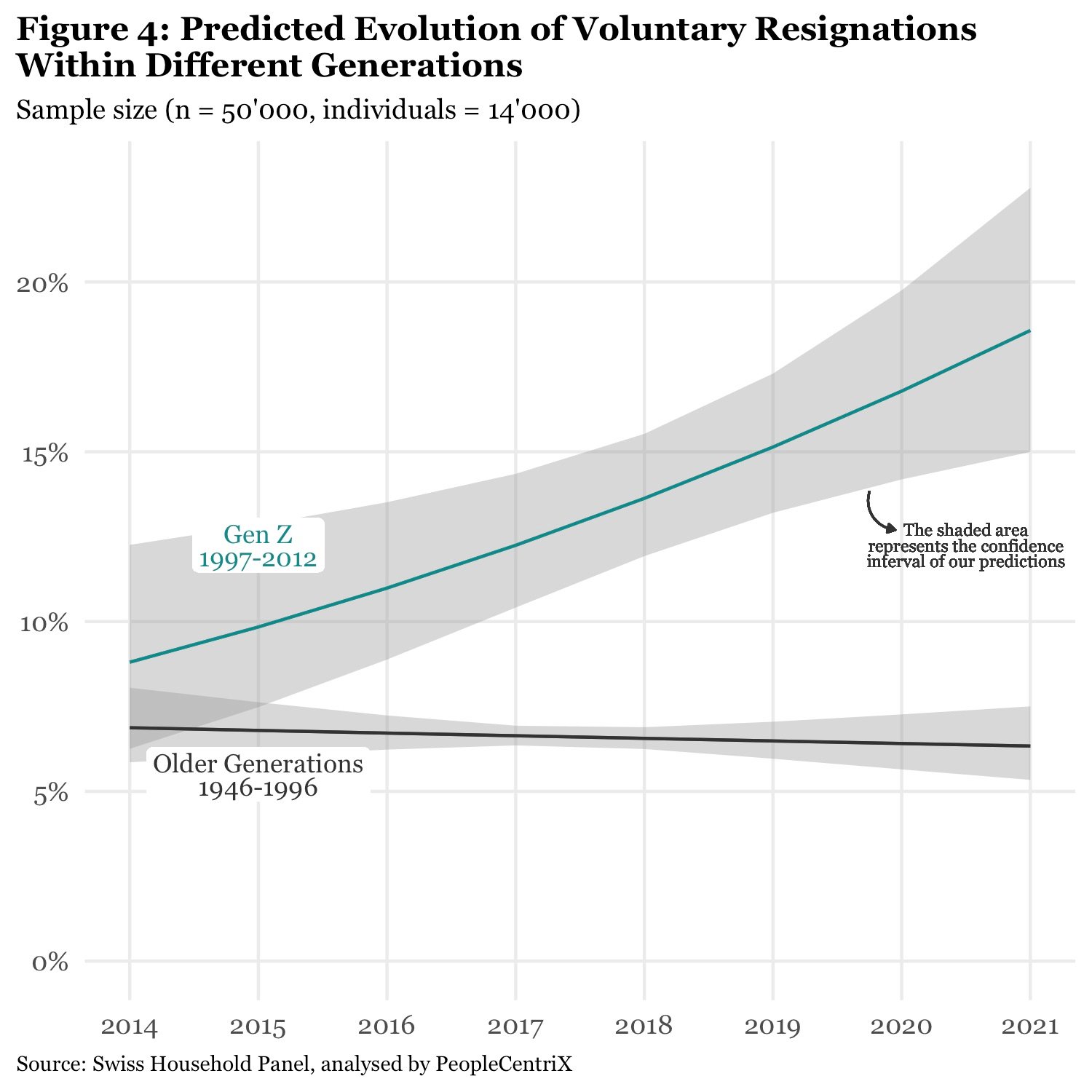- Gen Z workers—born between 1997 and 2012—seem to be driving the Great Resignation in Switzerland. The data suggests a growing proportion of Gen Z are choosing to leave their jobs—a trend that doesn’t appear to affect other generations.
- We estimate that the rate of voluntary terminations among Gen Z has grown by 10% every year since 2014.
- We also found that Gen Z were two times more likely to voluntarily leave their jobs than the combined total of other generations (Millennials, Gen X, Boomers) from 2014 to 2021.
This article is the first in a three-part series on “Myths & Truths about the Great Resignation in Switzerland: A Longitudinal Study of Generational Differences in Voluntary Turnover.” Read the second and third articles.
The “Great Resignation” in Switzerland didn’t start with the pandemic
Recent research by Harvard Business School Professors Joseph B. Fuller and William R. Kerr indicates that the “Great Resignation” did not start with the pandemic.1 Their research highlights a continual increase in American workers voluntarily leaving their organisations over the last ten years.
But are Swiss employers also facing this “Great Resignation”?
Our study suggests they are. We used data from the Swiss Household Panel to understand the generational shifts in voluntary turnover in Switzerland.a Resignations seemed to rise by 1% from 2014 to 2021, roughly the same percentage increase observed in the United States over the same period.1 Although the increase isn’t constant from year to year, the trend line suggests a growing number of Swiss workers are resigning voluntarily (Figure 1).

One might expect that the prospect of a looming recession would give firms a respite from increasing resignations. But the latest survey by McKinsey and Company indicates that 1 in 3 European workers plans to leave their job within the next 3 to 6 months.2 This holds true for Switzerland, where 34% of workers indicated such an intent.
So, who is driving the “Great Resignation” in Switzerland?
Gen Z is leading the “Great Resignation” in Switzerland
Evidence collected outside of Switzerland shows voluntary resignations are not uniformly distributed among generations. For example, in its Work Trend Index, Microsoft reports that Gen Z and Millennials are more likely to choose to leave their job than Gen X and Boomers.3
This appears to be the case in Switzerland too, where the data suggests Gen Z and Millennials constituted nearly two-thirds of voluntary job leavers in 2021 (Figure 2).

However, the data we analysed reveals that it isn’t Millennials who are driving the Great Resignation.4 Although they made up the highest proportion of voluntary resignations from 2014 to 2021, their share has been falling steadily since 2018.
In contrast, the number of resignations by Gen Zers has increased rapidly since 2019, beyond the fact that Gen Z represents a growing part of the workforce.
Gen Z workers appear to have different work expectations to older generations
The Covid pandemic seems to have catalysed the desire and determination of Gen Z employees to move freely between jobs (Figure 3).

We believe that newer generations entering the world of work have a clearer awareness of their expectations, needs and priorities about their careers and the organisation they work for. While this awareness did not necessarily arise with the pandemic, the gravity of the global health crisis made it clearer.
Why? The pandemic was probably one of the largest human experiments on how workers and organisations have been experiencing—for good or bad—new ways of living and working.
We think that Gen Z workers are more likely to express their discontent by leaving their employers. They typically have less work experience and may be more restless. For example, they may be more likely to leave their jobs if they feel disillusioned or if they want to explore other career options or industries. Additionally, a Swiss survey showed the pandemic has led many young adults to reconsider their life goals.5 As a result, the health crisis might have encouraged a growing number of Gen Z employees to rethink their career and switch jobs or industries. This response strategy has contributed to the Great Resignation.
We believe that older generations are more likely to express their discontent differently. For instance, now that most Millennials have left their twenties, a growing number are likely to value security and stability above fulfilling work experiences, as they settle down and build a family. Similarly, low labour market confidence among Gen X and Boomers might encourage older workers to value job security above fulfilling work experiences.6 As a result, older generations may remain in their jobs, but decide to reduce their overall contribution. This response strategy contributes to what is known as “Quiet Quitting”.
The rate of Gen Z resignations is growing steadily
These trends are true for our sample, but can we expand them to the Swiss working population as a whole?
We have statistically significant evidence that shows a growing number of Gen Z employees are voluntarily leaving their jobs.b
First, our model estimates that, on average, 11% to 15% of Gen Z workers in Switzerland voluntarily left their jobs between 2014 and 2021. In contrast, the model estimates that, on average, only 6% to 7% of workers in older generations voluntarily left their jobs during this period.c Therefore, our model suggests that, between 2014 and 2021, Gen Z workers were two times more likely to freely leave their jobs than those of older generations.
Next, our model finds that the rate of resignations among Gen Z workers grew by 10% every year between 2014 and 2021, while the rate among older generations remained stable over the same period (Figure 4).d

What’s next?
Our results are worrying. If the trend continues, Swiss companies could face high levels of attrition from a generation that is due to make up a growing part of their workforce. If companies are serious about future-proofing themselves, we believe that they should adopt people-centric practices. This means understanding the expectations of Gen Z, crafting a compelling work value proposition and co-designing work experiences that align with these expectations. In the next two articles of this three-part series, we’ll delve deeper into why businesses should care about this problem and what they can do to solve it.
AUTHORS
Tanguy Dulac, Founder & CEO of PeopleCentriX
Bruno Alves de Carvalho, Analyst & Lead Researcher at PeopleCentriX
Lily Unell, Analyst at PeopleCentriX
REFERENCES
- Joseph Fuller & William Kerr. The Great Resignation Didn’t Start with the Pandemic. Harv Bus Rev https://hbr.org/2022/03/the-great-resignation-didnt-start-with-the-pandemic (2022)
- McKinsey & Company. European talent is ready to walk out the door. How should companies respond?https://www.mckinsey.com/capabilities/people-and-organizational-performance/our-insights/european-talent-is-ready-to-walk-out-the-door-how-should-companies-respond (2022).
- Microsoft. Work Trend Index: Annual Report. https://www.microsoft.com/en-us/worklab/work-trend-index/great-expectations-making-hybrid-work-work (2022).
- Ian Cook. Who Is Driving the Great Resignation? Harv Bus Rev https://hbr.org/2021/09/who-is-driving-the-great-resignation (2021).
- Stephan Gerhard Huber. Young Adult Survey Switzerland. https://www.chx.ch/sites/default/files/95_345_03_dfi_yass_band_3_1.pdf (2022).
- Teresa Ghilarducci. Why Older Workers Fear The Labor Market. Forbes https://www.forbes.com/sites/teresaghilarducci/2020/02/10/why-older-workers-fear-the-labor-market/ (2020).
DATA
SHP Group, Living in Switzerland Waves 1-22 + Beta version wave 23 + Covid 19 data [Dataset]. FORS - Swiss Centre of Expertise in the Social Sciences. Distributed by SWISSUbase, Lausanne, 2022. DOI: https://doi.org/10.48573/vaxa-3w42
FOOTNOTES
- The Swiss Household Panel is a longitudinal survey of a random sample of the Swiss population collected every year since 1999. The same individuals are followed over time to observe changes in personal and social dynamics. We analysed data beginning in 2014 because this was the earliest year for which the survey had data for Gen Z workers. You can access the full biographical data at the end of this article.
- The significance level is very high: below 0.1%, so our results are unlikely to be due to chance and we can safely infer our observations to the wider Swiss working population.
- Note that we combine Millennials, Gen Xers and Boomers, but we should not forget that the rate of voluntary turnover varies between these three generations. It is also important to recognise that an employee’s decision to voluntarily leave their job might be due to personal or external factors that our model does not account for.
- These results hold irrespective of sociodemographic factors like sex, income, and level of education. We also controlled for the influence of cluster variables inherent in panel data, such as individuals and households, and for the growing portion of Gen Z workers in the sample. The latter ensures that the model doesn't conflate the rise of Gen Z workers in the active population with the increase in resignations among Gen Z employees. Finally, the level of uncertainty around the predicted probabilities of Gen Z is higher because of Gen Z’s comparatively smaller size in the sample.





